|
Like a lot of people I’m very curious about my Zodiac sign, it's mostly for fun but interesting all at the same time…I’m an Aries, 4 days in … I also know that
I have a bit of Pisces in me… now I don’t believe that all people with the same zodiac sign are identical but I do think that they have a lot of similar traits… Astrology is an ancient language that tells a story about your unique personality, purpose and journey through life. How does the sun sign influence your workout? The planetary point within your personal astrology can help to decide the type of workout that feeds your desire of workout and keeps your energy flowing. With that being said looking at Pure Energy Fitness we offer different classes that suit everyone and all signs… all you have to do is get yourself there(First class is free) (Plus new members can get a 1 month pass to try out all classes for only $40). We are a strong and heartfelt community and when you join the PEF community you’re family, we genuinely embrace everyone with love and kindness and we have a lot of fun. That’s what family is all about. We want you to feel like you can be yourself with individuals that motivate, encourage and accept with love. Here's what we offer at pef: Zumba: Set to music, you burn a lot of calories without realizing it. It's a high energy aerobic workout that involves muscle conditioning, balance and flexibility and lots of dancing with different and fun choreo that’s great for core strengthening and a total body workout. Zumba Strong: High Energy, kickboxing/HIIT/martial arts inspired exercise that provides a challenging total body workout led by music to motivate. Think burpees pushups and other high impact moves that's synced to music. Zumba Toning: (part of Zumba classes) emphasizes strengthening by incorporating weights to build muscle in the arms, legs and glutes, back and chest. Pilates: Transforming the way your body looks, feels and performs. The art of controlled movements, that improves flexibility, builds strength, lengthens, develops control and endurance in the entire body. It’s a mind, body control workout that puts emphasis on alignment, breathing and developing a strong core and improving coordination and balance.. Yoga: Improves your mental and physical health as well as focus on breath work, flowing postures and mindful meditation. The adoption of specific bodily postures, is widely practices for health and relaxation. Since I absolutely love fitness it’s cool to see what workout is best for each sign… so here we go… it’s a little bit of fun so please don’t take it too seriously but if you’re like me it’s intriguing and makes you go hmmm… Since Aries is the first sign in Zodiac system… let’s start with that Aries: March 21-April 20: is a cardinal fire sign, which explains why we are always on the move. We can’t sit still for too long (so true) or you get bored, so for exercise try where Aires doesn't lose interest… So Zumba Pilates, Zumba toning and Zumba strong to keep you motivated and even mix it up with Yoga for a little Zen, which Aries needs every once in a while after they burn their candles at both ends lol. Taurus: April 21-May 21: a fixed air sign known for being a chill, calm stabilizer, that fully embrace the sustaining power of the physical body. The challenge with this sign is getting outside the comfort zone of their usual fitness routine. Low impact and strength focused workouts are best. Zumba, Yoga and Pilates will do you well. Gemini: May 21-June 21: a mutable air sign, is energized by an adaptable curiosity and desire to learn and express. Gemini is known for being an intellectually alert thinker. To avoid boredom ensure you stay focused during your workout. Pilates and Zumba are best for you. Cancer: June 21-July 23: is a cardinal water sign and they are motivated by intentional activity that engages the emotional body and provides a release for all that energy. Embrace positive vibes and clear out any emotional stagnation through a light effective activity. Yoga is best for Cancer. Leo: July 23 to August 22: a fixed fire sign, but Leo is driven to succeed with unwavering passion and enthusiasm. Typically the life of the party, and very creative. Zumba and Zumba toning is your best workout that will keep you coming back for more! Virgo: August 23-September 22: is a mutable earth sign who love to learn and improve and are efficient. Not unusual for Virgo’s to find yourselves dotting every I, and crossing every T. Zumba and Zumba toning and Zumba strong is your best workout. Libra: September 23-October 22: a cardinal air sign, is a friendly, peaceful cooperator whose interests including finding balance and making things well. They are stimulated by thought and conversation. They also like to get caught up in what others are thinking or doing. Libra’s best workout is Pilates to get in control of your mind and body and Zumba Strong to add a little extra challenge. Scorpio: October 23-November 22: a fixed water sign, finds energy in intense emotional connection. They need a workout where they don’t dive too deep and get lost in intensity. Zumba toning and Zumba Strong is your best work out to be able to release emotion through powerful movements. Sagittarius: November 22-December 22: a mutable fire sign, are motivated by the freedom to explore and grow. They are the best athletes of all the signs. They possess great stamina but only if they are connected to your body, mind and spirit. High intense Pilates, Zumba Strong and Zumba are your best workouts. Capricorn: December 22-January 19: cardinal earth sign, are very disciplined, driven by structure and form. Choose a workout that emphasizes power and muscle control which will help you accomplish your goals... Pilates is your perfect workout. Aquarius: January 20-February 18: a fixed air sign, they love the big picture thinking and actions, they are great at being an individual while surrounded by a group and your best workout would be Zumba and Zumba toning where you can be amongst friends and also enjoy the cardio at your speed! Pisces: February 19-March 20: a mutable water sign, driven by emotional fluidity and deep inner work, you're empathetic and loved. You sometimes can feel a little too much so the best bet is to stay focused and do Yoga for your ideal workout. Whether you believe in astrology or not, whether you're a Leo or an Aquarius, it does kind of put in perspective why some people like certain workouts more than others. Pure Energy Fitness has something for all Zodiac signs, Zumba, (Zumba Toning), Zumba Strong, Pilates and Yoga. Enjoy and see you in class. Mika Midolo Written By Evolution Fitness for ACE High-intensity interval training (HIIT) has become hugely popular thanks to real results in shorter periods of time and extensive benefits. With busy schedules the norm, it’s no wonder so many clients and potential clients are now seeking out these kinds of workouts.
HIIT, which involves repeated sessions of relatively brief, intermittent exercise, usually performed at very high intensity, can be easily modified for various client needs and fitness levels. When combined with an expert nutrition program, personalized HIIT programs can elicit serious results and health benefits, including:
General Nutrition to Support a H.I.I.T. ProgramTo get the most out of any fitness program, clients should follow a healthy meal plan in general. Effective and well-rounded nutrition programs are based on a variety of healthful ingredients such as whole grains, fruits and vegetables, and lean proteins. The best nutrition plans provide adequate calories and macronutrients such as carbohydrates to fuel the body and provide energy stores for workouts. It’s important that these are expertly created programs that allow you to stay within your scope of practice and prevent clients adopting a restrictive diet that may inhibit their success. Adequate water is also a must to ensure complete hydration during workouts. Pre-workout Nutrition for HIITDue to the intensity of these workouts, it’s vital to follow a healthy nutrition plan with adequate nutrition in the days and hours leading up to a workout. Plan on a moderate- to high-carbohydrate meal that also includes protein approximately three to four hours before the HIIT workout, and then another high-carbohydrate snack within an hour after the workout. Good options for a pre-workout meal include:
Summertime is my favorite season from hiking in the woods, relaxing by the pool & socializing on the patio with friends and family - it’s all pretty great.
The unfortunate downside is that our active routines quickly goes out the window. So that’s why September is all about getting back in the groove and for many that’s easier said than done. Kids are just getting back to school, the days are getting shorter, and after a couple months of not doing much, it can be a little harder picking up where you left off – especially when it comes to exercising. It’s like Newton said, "objects in motion, stay in motion". Once you’ve stopped, it can be hard to regain lost momentum. With that in mind, here are some tips that will help you overcome the most common challenges and increase your chances of getting back into an active routine. 1. RENEW YOUR COMMITMENT To make a change stick, you have to fully commit. You can’t just want to start exercising again without a plan. Write down in specific detail, how your goal will be achieved. How will you know you're making progress? Why is it important for you to achieve this goal? What are you willing to commit to in order to achieve it? Set milestone markers along the way to measure your progress. 2. START SUPER TINY Starting small sets you up for success. It makes it easy. It makes you feel good and gives you something to celebrate, helping to create a positive feedback loop. Celebrate your win and when then you do, you feel even better. And the cycle repeats. And remember that setbacks don't make you a failure. The key here is making it really, really tiny. So tiny that you’d never want to skip it. So tiny that you’d be embarrassed not to complete it. Think 2 pushups, a five-minute walk, or just going outside. That’s all it takes to start getting into a good cycle, then a good rhythm, and before you know it, an active routine and it becomes a habit. 3. TINY, BUT FREQUENT Quick and easy is good, but you also want to aim for often because half the decisions we make every day are out of habit. So, the key is making one (or a few) of those daily habits more active. Think of things like taking the stairs instead of the escalator, or stretching for a few minutes when you wake up, or doing ten squats while you’re waiting for your coffee to brew. Tiny, but frequent. When you’re talking about exercising, the magic number seems to be at least 3 times a week. 4. HAVE A TRIGGER Habits are easier to form if they take place immediately after something you already do. That’s why sneaking in some light activity as soon as you wake up, or after you brush your teeth, works well. You’re less likely to forget, or make an excuse, because you have a reliable trigger. Some other good ones are right before or right after you eat lunch, as soon as you get to work or right when you get home (if you work pretty regular hours), or before you go to sleep. Anything that you do consistently at about the same time every day can work. 5. DON’T RELY ON MOTIVATION Finally, one of the biggest myths about forming a new habit is that it takes a huge amount of motivation. This myth is a problem because, as I’m sure you’re aware, motivation comes and goes. You might be pumped about getting active right now, but what about next week? What about when you’re all snuggled in your sofa after dinner? The solution? Stop relying on motivation alone. You’re not always going to feel motivated and that’s okay. That’s why focusing on forming a habit is so important. Because once it becomes a habit, once it becomes a normal part of your routine, you won’t need motivation. You’ll just do it because it’s what you do. BONUS TIPS! We’ve covered the five big ones, but there’s plenty of other smaller things you can do to get on track, like:
Make your goals measurable so you can identify exactly what it is you will see, hear and feel when you reach your goal. Being happier is not evidence; not smoking anymore because you adhere to a healthy lifestyle where you eat vegetables twice a day and fat only once a week, is. Measurable goals can go a long way in refining what exactly it is that you want, too. Defining the physical manifestations of your goal or objective makes it clearer, and easier to reach. Built in criteria to measure yourself against. How do you know you’ve reached your goal? I want to make more money….by how much more? I want to exercise more…I will go to class 3 times a week. You need to measure yourself to the goal. An objective target allows you to set markers and milestones along the way so you can chart your progress. We experience the strongest positive emotion when we make progress on our difficult goals Published by Time Health
Zumba was born in Colombia in the 1990s, quite by accident. A fitness instructor forgot to bring his usual workout music to class, so he grabbed some Latin albums from his car, ditched the constraints of a traditional workout and danced just like he would at a club. His class followed along, sweating to the salsa and rumba beats, and loving it. Since then, Zumba has pitched itself as more of a party than a workout. Indeed, some research suggests it may be the very best workout for people who hate to exercise. A Zumba class is like any other instructor-led workout, but with simple dance moves heavy on the hips and step counts. Those moves add up to a decent sweat, says John Porcari, a professor of exercise and sport science at the University of Wisconsin, La Crosse. He and his colleagues analyzed a group of women who were Zumba regulars and found that a 40-minute class burns about 370 calories, a little more than nine calories per minute. That’s roughly the same amount you’d work off if you ran at a slow-ish pace or biked at 15 miles per hour for the same amount of time. People worked hard in the class, too. “We found that they exercised at about 80% of maximum heart rate, and 60% V02 max,” which is a measure of oxygen used during exercise, he says. “We found it’s a pretty good workout—similar to moderately intense exercises like step aerobics or cardio kickboxing.” newsletter But the most impressive part of Zumba is how much it appeals to people who stay away from exercise. A study in the American Journal of Health Behavior showed that when women with type 2 diabetes and obesity did Zumba three times a week for 16 weeks, they lost an average of 2.5 pounds and lowered their percentage of body fat by 1%. More importantly, the women enjoyed the class so much that they made it a habit—very unusual for an aerobic exercise program. “After the study had ended, most the participants continued going,” says study coauthor Jamie Cooper, an associate professor at the University of Georgia. “It seems like most of them had fun, made friends and didn’t see Zumba as hard work." The workout-in-disguise has unique physical and mental health benefits. Another study linked Zumba’s hip-swinging, stomach-gyrating movements to increased core and trunk strength and better balance in older overweight women. After just eight weeks, the women’s quality-of-life scores jumped 9% and their self-esteem increased 16%. A related study on Zumba’s psychological benefits found that people who practice it feel more independent and said that their lives seemed more purposeful. It’s not hard to see why the activity would be invigorating and freeing. “You have to let go and have fun during Zumba,” Cooper says. Just as some people with anxiety take improv classes to relieve their social skittishness, dancing around other people may help Zumba-goers feel less shy or self-conscious about their bodies. The workout may be especially helpful for older adults who can't run or do more intense workouts (or for those who don't want to). One 2015 study found that even scaled-back versions of Zumba can help older adults keep up their cardiovascular fitness. More broadly, plenty of evidence suggests that dancing can help seniors maintain balance and coordination, lowering their risk for falls.Zumba is never going to compete with workouts like CrossFit or high-intensity interval training when it comes to physical fitness gains. “But not everyone is the type to sign up for CrossFit,” Cooper says. “There’s still a place for Zumba, because people really enjoy it.” 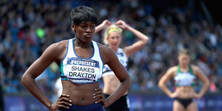 I describe myself as an ‘athlete with the biggest smile’, but truthfully it can sometimes be hard to maintain when you’ve had as many ups and downs as I have in my career. I still stand by it though, because you just have to stay positive through adversity. On the world stage, you have to be able to pick yourself up when you fall down. You learn to get over hurdles - the ones that life throws at you, as well as the ones on the track. Image (c) Scott Heavey / STRONG by Zumba One of the biggest hurdles was getting over the knee injury that I sustained at the 2013 World Championships. I was running really well all season, had become double European indoor Champion and won my semi-final so was feeling confident that I would at very least get a medal, pushing for the gold. Injury struck in the final so it wasn’t to be - and it has been a long process getting back to full fitness, but I’m a fighter and was determined to compete for my country again. With determination comes training - and to keep it varied I particularly enjoy group training sessions - I just feed off the positive energy of other people. I’ve always had my coach and my family, but in my sport it can still be motivating to feel part of a ‘team’. We’re not known as Team GB for nothing! I also find that, when I really need to concentrate and block out external environments, nothing beats listening to music when training to get you motivated and that’s a key aspect for me. I’m a big fan of hip hop and grime music and always put headphones in when I’m prepping for a race - it takes my mind off of the stress - music is really empowering in that respect and is key to any training I do. Music also gives me that extra boost to push me through the pain barrier. I read somewhere recently that studies actually show that moving in sync with music when you’re working out allows the body to use energy more efficiently, as well as distract people from pain and fatigue, elevate mood, increase endurance and promote metabolic efficiency. So if you’re to take any piece of advice from my first blog post on the HuffPost, it’s to set yourself up with a playlist before you start to workout. It will keep your momentum up and you’ll see more of an impact on your durability. In general, I think what I’d say to anyone who feels pushed to their fitness limits, or is experiencing a fitness barrier, is to stay strong! Pain is short-lived, but the joy of beating your fears or overcoming obstacles will remain with you for long time. That’s what I’ve learnt to do and I’m a much better athlete for it. STRONG by Zumba® has teamed up with Team GB athlete Perri Shakes-Drayton and Made in Chelsea star and personal trainer Ryan Libbey to launch the new fitness concept in the UK 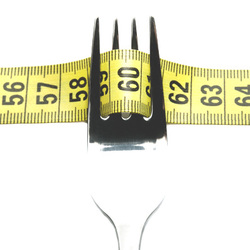 Change What’s On Your Plate Look beyond New Year’s black-eyed peas and 12 lucky grapes and alter your food choices to consistently include more fruits, veggies and water. zLife
|
Linda RaponiPTS, FIS, NWS, RYT200 Archives
February 2024
Categories |
Proudly powered by Weebly

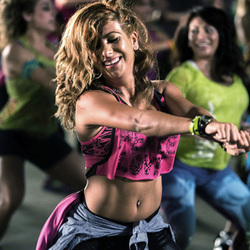

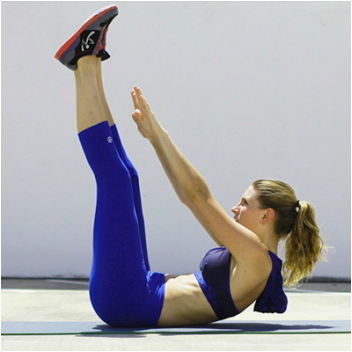
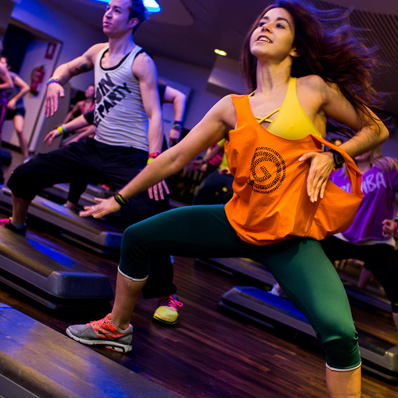
 RSS Feed
RSS Feed